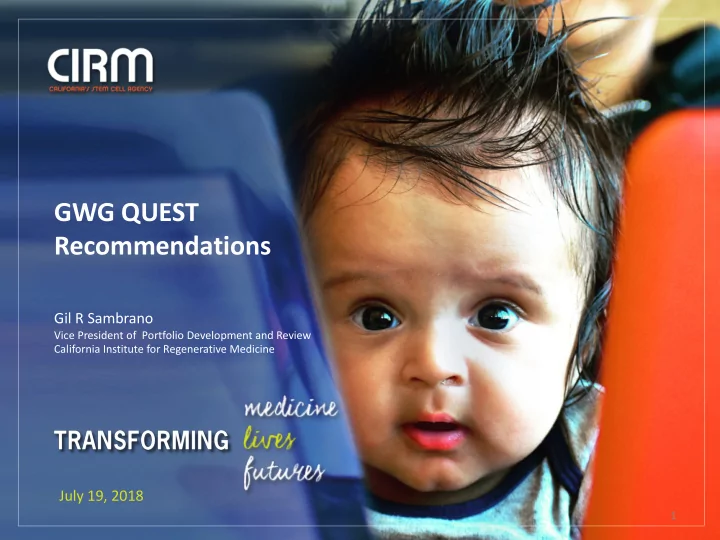

MISSION GWG QUEST Recommendations Gil R Sambrano Vice President of Portfolio Development and Review California Institute for Regenerative Medicine July 19, 2018 1
Funding Opportunities Approved New Single Product Pre-IND Meeting Therapy Idea Candidate or Equivalent 12/Year 1-2/Year 3/Year
CIRM Quest Discovery Program Objective The Quest Program promotes the discovery of promising new stem cell-based technologies that will be ready for translational studies within two years to ultimately improve patient care.
What qualifies for Quest? Projects that propose a candidate: § Therapeutic § Diagnostic § Medical device § Tool
What qualifies for Quest? § Stem/progenitor cell therapy § Reprogrammed cell therapy § Small molecule or biologic that stimulates, recruits or targets human endogenous stem cells or cancer stem cells § Device, diagnostic or tool that: § Uses stem/progenitor cells § Addresses a critical bottleneck in the stem cell therapy field
Review Criteria ü Does the project hold the necessary significance and potential for impact? ü Is the rationale sound? ü Is the project well planned and designed? ü Is the project feasible?
Scoring System § Score of “85-100” Recommended for funding, if funds are available § Score of “1-84” Not recommended for funding Applications are scored by all scientific members of the GWG with no conflict. The median of all individual GWG scores determines final score.
GWG Recommendations Number of Total Applicant Funds Apps Request Available Recommended for funding 14 $19,007,245 $10,000,000 Score 85-100 Not recommended for funding 27 Score 1-84 For each award, the final award amount shall not exceed the amount approved by the ICOC Application Review Subcommittee and may be reduced contingent on CIRM’s assessment of allowable costs and activities.
CIRM Team Recommendation Fund top 7 ranking applications (DISC2-11131 to DISC1-11175) § Utilizes $9,440,137 out of the $10M available § Captures the 4 applications with a unanimous GWG vote § Includes 6 cell therapy and 1 biologic approach § Captures 4 of 5 applications with previous CIRM funding
Overview of Recommended Applications
DISC2-11131 TITLE: Genetically Modified Hematopoietic Stem Cells for the Treatment of Danon Disease INDICATION: Danon disease PRODUCT TYPE: Cell therapy APPROACH: Genetically-modified autologous blood stem cell transplant
DISC2-11157 TITLE: Preclinical Development of An HSC- Engineered Off-The-Shelf iNKT Cell Therapy for Cancer INDICATION: Cancer PRODUCT TYPE: Cell therapy APPROACH: Genetically-modified allogeneic natural killer T cell transplant
DISC2-11036 TITLE: Non-viral reprogramming of the endogenous TCRα locus to direct stem memory T cells against shared neoantigens in malignant gliomas INDICATION: Glioma PRODUCT TYPE: Cell therapy APPROACH: Genetically-modified T stem cell memory cells targeting glioma
DISC2-10979 TITLE: Universal Pluripotent Liver Failure Therapy (UPLiFT) INDICATION: Liver-based metabolic diseases PRODUCT TYPE: Cell therapy APPROACH: Genetically-modified allogeneic hepatic progenitor cells
DISC2-11105 TITLE: Pluripotent stem cell-derived bladder epithelial progenitors for definitive cell replacement therapy of bladder cancer INDICATION: Bladder cancer PRODUCT TYPE: Cell therapy APPROACH: hESC-derived bladder progenitor cells to replace pre-cancerous urothelium
DISC2-11192 TITLE: Mesenchymal stem cell extracellular vesicles as therapy for pulmonary fibrosis INDICATION: Pulmonary fibrosis PRODUCT TYPE: Biologic APPROACH: Vesicles from mesenchymal stem cells with anti-fibrotic potential
DISC2-11175 TITLE: Therapeutic immune tolerant human islet- like organoids (HILOs) for Type 1 Diabetes INDICATION: Type 1 diabetes PRODUCT TYPE: Cell therapy APPROACH: hESC-derived immune-tolerant islet- like organoids
DISC2-10973 TITLE: Small Molecule Proteostasis Regulators to Treat Photoreceptor Diseases INDICATION: Photoreceptor diseases of the eye PRODUCT TYPE: Small molecule APPROACH: Screen of small molecule compounds to correct photoreceptor pathology
DISC2-11070 TITLE: Drug Development for Autism Spectrum Disorder Using Human Patient iPSCs INDICATION: Autism PRODUCT TYPE: Small molecule APPROACH: Screen for drugs that increase MEF2C in patient-derived iPSCs
DISC2-11183 TITLE: A screen for drugs to protect against chemotherapy-induced hearing loss, using sensory hair cells derived by direct lineage reprogramming from hiPSCs INDICATION: Hearing loss PRODUCT TYPE: Small molecule screening tool APPROACH: Screening tool for drugs that protect iPSC-derived sensory hair cells
DISC2-11199 TITLE: Modulation of the Wnt pathway to restore inner ear function INDICATION: Hearing loss PRODUCT TYPE: Biologic (protein) APPROACH: Study Wnt agonists that can stimulate hair cell regeneration
DISC2-11109 TITLE: Regenerative Thymic Tissues as Curative Cell Therapy for Patients with 22q11 Deletion Syndrome INDICATION: Chromosome 22q11 Deletion Syndrome PRODUCT TYPE: Cell therapy APPROACH: hPSC-derived thymus organoid transplant for immune system restoration
DISC2-11107 TITLE: Chimeric Antigen Receptor-Engineered Stem/Memory T Cells for the Treatment of Recurrent Ovarian Cancer INDICATION: Ovarian cancer PRODUCT TYPE: Cell therapy APPROACH: CAR-T cell therapy that targets ovarian cancer
DISC2-11165 TITLE: Develop iPSC-derived microglia to treat progranulin-deficient Frontotemporal Dementia INDICATION: Frontotemporal dementia PRODUCT TYPE: Cell therapy APPROACH: iPSC-derived microglia to treat progranulin deficiency
Recommend
More recommend